This recipe assumes the eggs have been refrigerated and have just been removed from the refrigerator before beginning.
Related Articles
You really need only about 1/2-in. (more than a cm) of water above the eggs for this to work well, but I find that some amount of water will escape as vapor while it is boiling and waiting for eggs to be deposited. Depending on how often you check on the pot, water loss can be substantial, so try to make sure you have at least an inch of water over the eggs before you start.
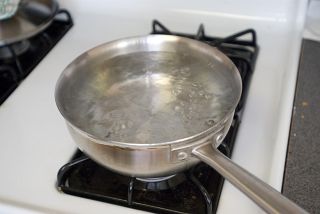 Remove the eggs from the water and place the pot (with its lid on) onto the burner on medium-high to bring to a boil. The water is ready once it reaches a rolling boil (large bubbles rising cause the surface of the water to tumble and roll).
Remove the eggs from the water and place the pot (with its lid on) onto the burner on medium-high to bring to a boil. The water is ready once it reaches a rolling boil (large bubbles rising cause the surface of the water to tumble and roll).In the original article I wrote, the eggs were placed into the water and boiled for 5 minutes before being shocked in ice water. After more testing with another couple dozen eggs, I'm now advocating the following method:
Once the water is boiling, place refrigerated large eggs into the boiling water, cover, and remove the pot from the heat. Allow the eggs to steep in the nearly boiling water for seven minutes.
As soon as seven minutes are up, remove the eggs and place into an ice water bath. This will chill the exterior of the egg serving two purposes. When rapidly cooked, eggs, like most dense foods, do not heat evenly. The outside portions of the egg (the egg whites) are much hotter than the interior (the egg yolk). By shocking the shell with ice water, we lower the temperature of the egg whites to a temperature below that of the egg yolk and this causes the egg yolk to stop cooking. Otherwise, the yolk would continue to draw heat from the whites and raise its temperature while the egg white temperature lowered resulting in overcooked egg yolks.
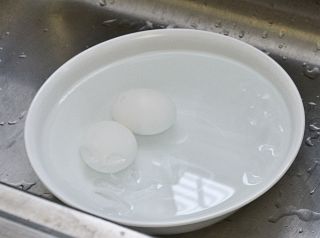 The other reason for shocking the eggs is that it causes a little bit of shrinkage in the egg, hopefully making it easier to peel.
The other reason for shocking the eggs is that it causes a little bit of shrinkage in the egg, hopefully making it easier to peel.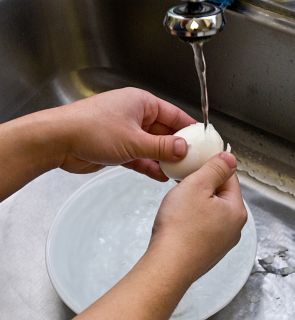 After about 1 minute, peel the eggs. I find it easiest to do this by tapping the egg lightly (just enough to crack the shell) all over starting with the fat end (I start here because there's an air pocket and I feel more comfortable using a little more force to break the shell without damaging the egg). I then run a thin stream of cold water to help pull away the shell and membrane as I carefully peel the egg. Be careful, it's not as hardy as a hard boiled egg due to the liquid core.
After about 1 minute, peel the eggs. I find it easiest to do this by tapping the egg lightly (just enough to crack the shell) all over starting with the fat end (I start here because there's an air pocket and I feel more comfortable using a little more force to break the shell without damaging the egg). I then run a thin stream of cold water to help pull away the shell and membrane as I carefully peel the egg. Be careful, it's not as hardy as a hard boiled egg due to the liquid core.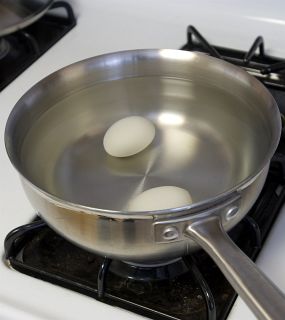 If the soft boiled eggs are too cold after you're done peeling them, you can submerge then into the cooking liquid (which should be just around simmering at this point in time) to reheat. About two to three minutes will bring it back up to temperature.
If the soft boiled eggs are too cold after you're done peeling them, you can submerge then into the cooking liquid (which should be just around simmering at this point in time) to reheat. About two to three minutes will bring it back up to temperature.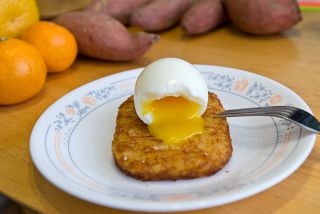 Served with a light sprinkling of kosher salt, a soft boiled egg makes a great addition to breakfast or a pleasant surprise accompanying your dinner entree.?}?>
Served with a light sprinkling of kosher salt, a soft boiled egg makes a great addition to breakfast or a pleasant surprise accompanying your dinner entree.?}?>If this is your first time using this recipe, I suggest cooking one or two eggs with this method first. Breaking into the egg, you should find the whites almost fully cooked (solid) with the yellow yolk thickened and viscous.
Note: For individuals with a poor immune system, the young, or the elderly, it is not advisable to consume soft boiled eggs or undercooked yolks.
Soft Boiled Eggs
| whole large eggs | steep in covered pot of just boiled water for 7 minutes | shock in ice water | peel |
Related Articles

I would have thought that 5 minutes at a boil would mean they were overcooked.
Might have to try it some time for comparison!
Are you kidding me? Such a waste of effort, just guess about the water height, but most importantly you DO NOT need at least an inch of water above the eggs. I just made some perfect hard boiled eggs tonight with water that didn't even quite cover the eggs. I make soft-boiled eggs all the time the same way.
The only reason I can think of for putting a lot of water, is the same reason you want a lot of water when boiling pasta: so that the water doesn't cool down a lot when you add the room temperature/fridge temperature eggs/pasta to the water. But if you're doing one egg, having extra water in the pot won't make a huge difference. Secondly, if you have less water, even though the water may cool down a bit, it will heat up fast anyways when you are doing the keep-the-pot-on-the-element method.
Kitt
http://www.kittalog.com
This is kind of straying from topic, but I tried making tea eggs recently and I really like them.
These eggs are hard boiled all the way, then the shell is cracked but not peeled. Then you steep the eggs in tea in the fridge for a day or too. If you do it right, the egg gets a pretty cracked shell pattern, and the tea gives the egg a nice complimentary flavor.
Most of the ones I have made I cracked the shell too finely, and the tea seeped in and just colored the entire egg. Still tasted good, but not something I would serve at a party.
I think the secret it to tap the egg with a butter knife instead of rolling it, and using really strong tea to steep in.
Next, deviled tea eggs...I'm sure I will come up with some really horrendous combinations in the beginning...scallions, ginger, something that colors the egg yolk to compliment the marblized white...add texture...truffles...ham...beans...hash...hmmmm, not all together though
I'm retesting the cooking method with a couple different pots as we speak. I'll probably update the recipe with a non-boiling recipe once I'm done with my tests. Stay tuned.
there are purpose made "egg piercers" - I have used an ice pick in a pinch.
Regards,
Pierre
Greg,
if your concern about cracked eggs are on the whites running out, i would suggest adding a tablespoon of white vinegar in the boiling water. that should keep the whites in.
or if it's the cracks that bother you, i usually wait about 30 seconds to 1 minute before i put in cold eggs. that had so far kept mine from cracking, and still cooks the eggs to my satisfaction. by the way, i take the eggs out of the fridge before i even start filling the pot with water to boil.
In the end the last bit of peel sticks still to the Egg and hinders complete peeling without breaking the Egg.
At which point could I have messed up.
perhaps at no point <g>
it is rumored that really fresh eggs can be more difficult to "peel" -
another theory says start with the eggs at room temp
for the cold water "quench" I like to use actual ice water - a bowl of cold water with a bunch of ice cubes....
and then there are some eggs that simply will _not_ cooperate even when asked nicely.....
Ah, here freshness of the eggs makes a difference. Older eggs are less likely to crack when you have ample water because they float (due to the air pocket in the big end) and won't smack into the bottom of the pan.
Follow all instructions up to removing the pan from the heat. Turn off the burner, but leave the pan on the heat for 5 minutes. Remove eggs, shock in cold water, enjoy .
Maybe the make of my pan lets the water cool more quickly or some other reason. Whatever the reason, this slight modification worked perfectly for me. I've never managed to make soft boiled eggs that perfectly.
Also, for peeling, I gently tap with the dull side of a table knife to crack all over, then gently peel.
This is how I do it:
1. Cut a square of plastic film about 25x25 cm
2. Cover the inside of a cup with the plastic film, spray the film with olive oil
3. Crack an egg in the cup, add salt and pepper to taste
4. Carefully make a small package and tie the edges with some thread (I have used dental floss)
5. Boil the egg 5 to 7 min.
6. Without pinching the egg, cut the thread and remove the egg from the plastic, sometimes it sticks, so be careful.
Ps: I learnt this technique from Jose Mari Arzak @ Restaurante Arzak in San Sebastian, Spain,
http://images.cookingforengineers.com/pics3/640/ND2_6234_LR.jpg
Looks yummy :-)
http://images.cookingforengineers.com/pics3/640/ND2_6234_LR.jpg
Looks yummy :-)
It's a hash brown patty (from Trade Joe's).
Altitude affects cooking because air pressure is reduced at high altitudes. With a reduction of air pressure comes a lowering of the boiling point of water which will reduce the maximum temperature that water in an unsealed container can be brought to (and thus how much a food cooks in a given amount of time). The difference between ten to twenty feet (an indeed a few hundred feet) will not make much of a difference. However, being 5,000 ft above sea level will affect your ability to replicate a recipe that was developed for use at or near sea level.
First, it's really a bad idea to put the eggs straight from the fridge in the boiling water. Most "commercial" eggs will crack. Drilling a small hole in the shell may do the trick, though.
Second, the optimum time period to get a runny yolk (just a pinch thickened is best) and a solid while is very narrow. The most forgiving method is the one in which one brings the eggs to a boil, then immediately turns off the heat and waits a certain time.
Third, whatever the method, the timing depends on so many factors (heat level and type, water quantity, egg count, egg size, atmospheric pressure) that one must not trust someone else's time and instead experiment on his/her own setup.
Everytime I moved, I had to recalibrate the method. However, for me the struggle is over: about two years ago a stumbled upon an egg cooker, a simple electric gadget that controls the timing by how long it takes a calibrated amount of water to evaporate completely. It's very easy and with perfectly consistent results.
Alternately, I remember reading in a cookbook about the fact that temperature at which the yolk hardens is about 5-6*C higher than of the white (which is 70*C?). Therefore, one can get perfect soft-boiled eggs by controlling the water temperature at a point between the two and keeping the egg at that temperature long enough for the white to harden.
http://khymos.org/eggs.php
If the shell is a problem, there is an easy solution, get rid of it before cooking.
This is how I do it:
1. Cut a square of plastic film about 25x25 cm
2. Cover the inside of a cup with the plastic film, spray the film with olive oil
3. Crack an egg in the cup, add salt and pepper to taste
4. Carefully make a small package and tie the edges with some thread (I have used dental floss)
5. Boil the egg 5 to 7 min.
6. Without pinching the egg, cut the thread and remove the egg from the plastic, sometimes it sticks, so be careful.
Ps: I learnt this technique from Jose Mari Arzak @ Restaurante Arzak in San Sebastian, Spain
I love San Sebastian. It's a great great city, especially the fireworks in summer. I would love to go back and try all the famous restaurants there. Now, maybe a stupid question: do you remove the plastic out of the cup or do you leave it in? I guess you take it out, but I'm not entirely sure from your description.
Michael, I have always heard that shocking the eggs to make them peel easier is a complete myth, and that the only thing that matters here is how young/old the eggs are. Any thoughts on this? Do you have scientific proof on the shocking-theory?
In a nutshell; crack your egg into a small dish and set aside while the water heats up. Boil about 1.5" water (or enough to cover the egg) and a tablespoon of white vinegar in a small fry pan, turn heat down to a simmer or very gentil boil and add one, two or three eggs. Watch the eggs simmer skimming the foam that may develop. When the white of the egg looks and acts cooked - about three or four minutes - remmove it with a slotted spoon to a paper towel to drain for about 10 seconds. The egg whites can be trimmed up at this point to get rid of unattractive edges. Then transfer your poached egg to your perferred dish and enjoy.
1) pinhole in one end of the egg (to keep them from cracking during cooking)
2) 45 seconds in the ice bath
Other than that, these were the first soft boiled eggs I've ever made and were they good!
For soft boiled, fill the bottom half of a glass double-boiler 3/4 with cold/cool tap water. If cooking with electric, place a metal wire grid over the coil with pot on top, bring to a rolling boil over a medium-high heat (high heat may crack the glass, and also is too hot for the actual cooking.) If cooking with gas, pot can be placed directly over flame, but also at a medium-high heat. When water is rolling, gently lower eggs, one at a time, with large spoon or ladle, into water. (We recommend cooking no more than four eggs at a time.) Set timer for 3 minutes and as soon as the bell sounds, place pot in sink and run cold water into hot water in pot at full force. As soon as pot is filled to brim, gently overturn into collender.
To open, I have a wonderful tool. This is a double circle of metal with a center hole and scissor-type handles attached to the outside. When you pinch the handles together, "teeth" come out of the sides of the center hole and, placed over the small end of a soft-boiled egg placed in an egg-cup, neatly removes enough of the shell to get a small teaspoon into the
large end of the egg. You can salt and pepper through this opening so that it's ready to eat.
If you can't find this inexpensive tool at a local kitchen supplier, try sterilizing small-bladed manicure scissors in boiling water, place egg in egg-cup or dessert saucer-type dish, gently puncture small end of egg about 1/2" below top with scissors and slowly cut the top 1/2" from the rest of the egg. A small spoon, such as a demi-tasse, can be used to empty the egg into the saucer and it then can be eaten "as is" or spooned over buttered toast for a delicious breakfast. I find it much easier to eat or serve directly from the reminant portion of the shell (which also keeps the egg warm), rather than try to remove the shell from the egg and keep the white intact enough not to loose the yellow. Also, complete peeling takes longer and the egg cools too rapidly for tasty eating.
Basically you need to know the temperature and diameter of your egg, then you can calculate the perfect cooking time in boiling water. He made a template which gives you the needed time for each diameter, but sadly its not available online.
Cook on
Chris
This website suggests that you make a science out of cooking -
>so where are the formulae for amount of water required per egg.
>surface area of the part being heated - of the container.
>temperature needed to achieve and sustain for soft boiled eggs.
>wider versus narrower but taller containers - which is more efficient.
>different heating sources > wood fire > coal fire > gas hob > electric hob >amount of gas / electricity used - which is better or worse and why.
>how many times have you reproduced the results successfully ?
too many unanswered questions.
all i want is some soft boiled eggs - [/list]
Place your eggs [large to extra large, straight out of the refrigerator, ] in one layer in a pot not much bigger than the amount of eggs you want to cook. Cover them just barely with cold water, and heat on high till boiling[ no lid]. Turn heat down to simmer and continue to cook for 3 -3 1/2 minutes [3 min if you like your egg white still a little bit soft near the yolk, 3 1/2 min if you want to make sure the egg white is hardened all over]. Replace boiling water with cold water till eggs are warm, not hot [to the same effect as moving them to ice water]. Eat warm, out of the shell. :)
good idea, but all wrong.
putting a hole in the _large_ end of the egg allows the pocket of gas that accumulates there as an egg ages to expand without causing - or furthering pre-existing - cracking of the shell.
eggs contain sulfur. eggs contain iron.
it is the mixture of those two elements at the white/yolk interface that produces the greenish ring when overcooked or kept hot too long or kept cold really too long.
so for the theory that the sulfur collects in the pocket to be true:
(a) it has to migrate out of the egg "innards"
(b) penetrate the membrane and collect in the pocket.
(c) upon being cooked, and not being released it has to
(d) penetrate the membrane, now going backwards
(so,,, if it likes it so much inside the egg, why did it leave?)
(e) migrate back into the egg
(f) find some iron to bind
there's a whole bunch of folk lore about how to prevent the green rings. add salt, add vinegar, start hot, start cold, don't start, on and on.
bottom line - too much temp for too long a time and you get a ring. it's a chemistry thing.
Put two refrigerated eggs in an empty saucepan.
Fill the saucepan with water until it covers the eggs.
Place the pan on the burner and crank it up to "high" heat. (Note that I have an old coil burner stove top.)
Set a kitchen timer for 12 minutes. (You will not need as much time if you have a gas or ceramic cooktop.)
Then I walk away.
When the timer dings I transfer the eggs to a bowl of ice water and set the bowl in the refrigerator for about 30 minutes while I finish getting ready for work.
I pull them out of the fridge on my way out the door and enjoy them with fruit and coffee at my desk.
And that, my friends, is how a workin' woman does it.
P.S. - I like the idea of boiling the water, then removing it from the heat, and placing the eggs in. Then it doesn't matter what kind of cooktop you have. I'll have to try that method sometime.
With a colleague, recently in a desert location, altitude 2,100m, ambient temperature 42degC, it took a number of iterations to get this right and, in winter, temperature -2degC it changed (unfortunately we were not recording the atmospheric pressure (silly, I know but the meteo data gatherer was not installed!).
So here is a list of variables (with the aim to boil and cool at outside temperature, ice baths being impractical everywhere) that could affect timings:
Altitude
Ambient temperature (? dubious since we are just concerned with boiling water ?)
Atmospheric pressure
Humidity (?)
Egg temperature on water drop entry
Egg volume (? or ratio of length to width "circumference" ?)
Water salinity
Any further variables or ones that you consider redundant?
SUPPERMAN, I also steam my "hard-boiled" eggs and now really like them that way (didn't like the "rubbery" texture of the whites when boiling them in water--tried various ways).
I think I use 6 min rather than 7 as mentioned, but the size of the egg and coldness matters too; they're all good.
Here's what I wrote about that before in a post about peeling eggs:
[color=darkblue:4148796f58]. . Wanted to add though that steaming eggs creates whites that are much less rubbery and firm than boiling . . . They're quite "tender," in fact.
I've eaten lots more "hard-boiled" eggs since discovering that... never been a fan of tasteless/rubbery eggwhites.
Chopping just one steamed egg (I cheat with two cutting orientations in an egg slicer) then mixing in some mayo and a bit of salt makes a really delicious and quick egg salad sandwich on toast.
my technique:
...poke a hole in the large end of the egg or eggs
...lay in a shallow bowl
...put bowl in a bamboo steamer** over boiling water (lid on) to cook
...remove with tongs/etc and eat, or cool
(**works with any kind of kludgy steaming setup though) [/color:4148796f58]
.
couple of duplicates in the post -
the basic principles:
heat will flow from a hotter area to a cooler area
the rate at which heat flows depends on:
- temperature difference
- coefficients of thermal conductivity
- the shell has one coefficient
- the membrane has one coefficient
- the white has one coefficient
- the yoke has one coefficient
don't know for fact, but I suspect that the coefficient of thermal conductivity for the white and the yoke may change as they solidify . . .
the rate is how many BTU/area will flow over time.
so the surface area of the egg determines how many absolute BTU enter the insides over time.
presuming the 'whole egg' is at the same temperature, one could calculate how many BTU is needed to raise the temperature of the mass of the white and the mass of the yolk to the desired temperature, and how many BTU 'get wasted' heating up the shell and the membrane via the the (four) coefficients of thermal capacitance - which determines how many BTU/mass is required to raise the temperature per degree.
if the egg is left out on the counter for some time, it's no longer at a uniform temperature.
makes things yet more complicated.
so if you know:
- the temperature of the cooking medium
- the temperature of the uncooked egg
- egg surface area
- interior mass, by component
- all the coefficients
- what end point temperature you desire
then the calculations are straightforward.
although altitude/atmospheric pressure does affect the boiling point of water - and its resulting steam - but it's probably easier to measure the temperature of the cooking medium vs atmospheric pressure when camping.
measuring the temperature of the medium also negates the concern of salinity/mineral content of water - which does affect its boiling point.
Michael did some timing experiments here:
http://www.cookingforengineers.com/forums/viewtopic.php?t=1551&start=0
of course, not everyone likes their eggs done to the same degree.
some ideas on temperature can be found here:
http://www.seriouseats.com/2009/10/the-food-lab-science-of-how-to-cook-perfect-boiled-eggs.html
after the initial calculations, one has to loop back to the question of rubbery whites.
if the cooking medium is too hot, the temperature gradient from the outside to the center is too great - yoke may be perfect, but the white got too hot and went rubbery.....
the solution is quite simple, options are:
(a) reduce the temperature of the cooking medium and recalculate the timing (this I suspect is the secret behind the steaming technique)
(b) increase the temperature of the uncooked egg and recalculate the timing.
pretty simple - most any teenager could probably write an app for that . . . .
If you want to waste eggs, use this method.
If you want regular soft boiled eggs follow the directions on any number of millions of google results.
Thank you for the article!!!!!
As an added precaution, I also put 1 tbsp of salt in the water to prevent major leakages if they do crack.
Frank in NYC :)
Hello ya'll. I sat down for "a minute" to see what others said about the soft boiled egg & found this fascinating site!! Fifteen minutes later, I was still reading. Everything is interesting & informative. I copied the above, because it is exactly like my story, except add bout a dozen years to the age! My mother always cooked soft boiled eggs this way, thus so do I. Sometimes they are a bit less or more done -- all the variables, ya know.
I tried the dropping cold eggs into boiling water & steaming, only I left for 6 minutes, as I like a really soft (almost raw) egg. Worked just as well as the "old fashioned" way, but I found the ice water just an unnecessary step which, for me, cooled the eggs off a bit too much vs running cold water.
I love this site & will check out much more. Thanks! By the way, I am at sea level!
a prolonged dip in ice water does work well for cleanly peeling hard boiled eggs - but
soft boiled - whack / open / scoop out - what's to peel?
Have you ever tried steaming eggs?
see:
https://www.scienceofcooking.com/eggs/anatomy-of-a-chicken-egg.html
2. Adding salt to the water beforehand would make the eggs self-sealing in case of the above event.
3. Releasing the air by drilling a hole on the base of the egg beforehand gives it a nicer shape
4. Cooling the pan under tap water immediately is good. I find that swirling the eggs against the walls of the pan afterwards works well in uniformly cracking the shells, making it easier to peel them off.
the thermal shock does not crack egg shells, however an egg that has suffered handling damage can have a per-existing crack - if the air sac on the big end is not vented, the internal pressure of the egg heating up will cause (typically) the white to spurt out.
with the electronics and material handling available today, eggs that have been machine washed, inspected and packed seldom have cracks. in the old days of 'blind' mechanical handling and human visual inspections, cracks were more frequent.
note that not all places on the globe have that kind of equipment - so the situation will vary by area.